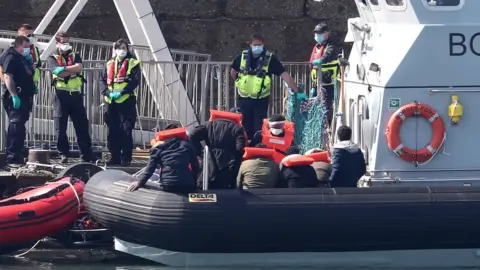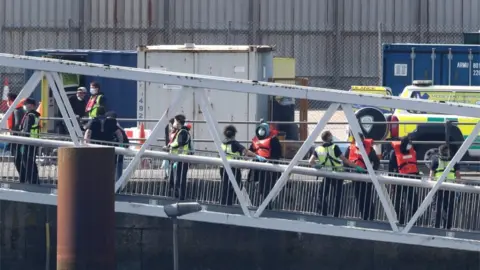Migrant crossings: 227 people intercepted amid lockdown spike
 Gareth Fuller/PA
Gareth Fuller/PAAt least 227 migrants have been intercepted in two days as they tried to cross the English Channel to reach the UK.
Eight boats carrying 145 people were stopped on Friday, the Home Office confirmed - a record for a single day.
A further 82 were intercepted on Saturday.
Those picked up by Border Force officials said they were Iranian, Iraqi, Kuwaiti, Syrian and Afghan nationals.
Friday's total included 51 people packed on board a single inflatable boat, the Home Office said.
Of 82 people detained on Saturday, 70 were aboard inflatable boats, while 12 men were found at Dungeness on the Kent coast.
A Home Office spokesman said French authorities had prevented a total of 44 people from crossing.
On Sunday and Monday more than 130 suspected migrants were stopped as they attempted to reach the UK from France.
Home Secretary Priti Patel has acknowledged that a recent increase in the number of migrant boats making the dangerous crossing is linked to the Covid-19 lockdown.
Since lockdown was announced in Britain on 23 March, at least 609 migrants have been intercepted by UK authorities and brought ashore.
 Gareth Fuller/PA
Gareth Fuller/PAClare Moseley, from aid group Care4Calais, said it was "little wonder" those living in French refugee camps were "desperate to make this dangerous crossing, given the awful conditions they face".
"Coronavirus has made a bad situation life-threateningly worse," she said.
"These people are fleeing terrifying situations in some of the most dangerous parts of the world. They aim for the UK because they want to be safe.
"Many have family or other connections, and others know our language and want to integrate and contribute," she said.
Minister for immigration compliance Chris Philp said the recent increase in crossings was "totally unacceptable" and it was "sickening that smugglers are willing to put people's lives at risk, including children".
He said the government was "stepping up action to stop the crossings, going after the criminals perpetrating these heinous crimes and prosecuting them for their criminal activity".

Follow BBC South East on Facebook, on Twitter, and on Instagram. Send your story ideas to [email protected].
